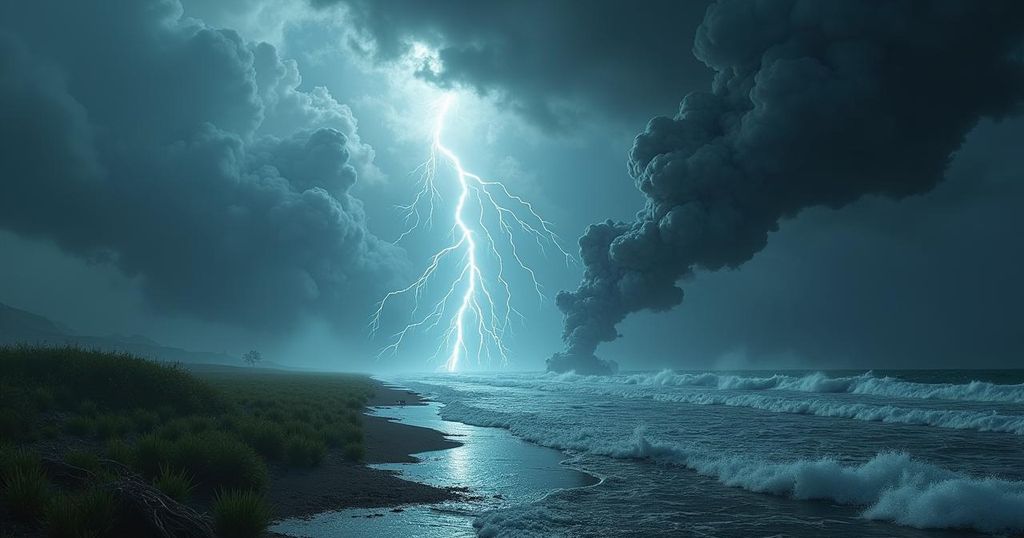Reassessing National Security in the Era of Climate Change and Pandemics
The recent hurricanes Milton and Helene have showcased the urgent need to view climate change as a significant national security threat, more damaging than traditional adversaries. Hurricane Milton impacted Florida severely, while Helene brought devastation to communities far inland. Military leaders have emphasized the existential nature of climate threats, with calls for a broader interpretation of national security that includes climate change and public health. Historical views from President Roosevelt suggest a more comprehensive understanding of national security. Recent events highlight the necessity for proactive planning against future climate and health crises, warranting a reevaluation of existing policies.
Recent catastrophic hurricanes, notably Hurricane Milton and Hurricane Helene, have illuminated a grave reality: climate change poses a more significant threat to American lives than traditional foreign adversaries. Hurricane Milton has wreaked havoc across parts of Florida, while Hurricane Helene inflicted severe damage on communities far inland, resulting in substantial casualties. The scientific consensus firmly links the increasing intensity of such storms to rising ocean temperatures, driven by climate change. As a consequence of these events, it is imperative to reconceptualize climate change as a critical national security concern, a position underlined by statements from military officials, including U.S. Secretary of Defense Lloyd Austin, who articulated that “the climate crisis does” indeed merit existential consideration among threats facing the nation. Particularly vulnerable are key military installations in low-lying areas, such as naval bases in Norfolk, Virginia, which are at risk from rising sea levels. The ongoing climate crisis contributes to global instability, exacerbating conflicts and prompting mass migrations of climate refugees. For example, the conflict in Sudan has been intensified by environmental stresses, creating further complexities in international security. Historical perspectives on national security, as presented in Peter Roady’s recent work, suggest that former President Franklin Delano Roosevelt broadened the idea of national security to encompass economic stability and social welfare, thereby striving for “freedom from want.” This perspective starkly contrasts with the modern interpretation that has largely focused on military threats and terrorist activities. In the wake of the COVID-19 pandemic, which claimed approximately 1.2 million American lives—similar to the toll of all wars since the American Revolution—it has become clear that threats to public health should also be prioritized within national security strategies. The need for preparedness against potential future pandemics remains pressing, as evidenced by reports from the nonpartisan COVID Crisis Group detailing significant vulnerabilities in the current strategy. The recent hurricanes may serve as a wake-up call for American policymakers to take proactive measures against climate change, including enforcing regulations that limit construction in flood-prone areas. As the nation contemplates its security status in light of these compounding threats—climate change, pandemics, and other emerging crises—it is essential to engage in a comprehensive dialogue regarding the true nature of national security.
The recent impacts of hurricanes Milton and Helene underscore the urgency of addressing climate change as a national security issue. The increasing severity of hurricanes due to climate change exemplifies the immediate risks that natural disasters pose to American lives and infrastructure, surpassing traditional threats. U.S. military and government officials are voicing concerns over the effects of climate change, from the vulnerability of military bases to the broader implications of global instability driven by environmental factors. The historical context provided by Roosevelt’s national security framework advocates for a more holistic understanding of security threats that include economic and social stability, reflecting an urgent need for reform in current policy perspectives.
The devastating effects of climate change, as exemplified by the recent hurricanes, demand a reevaluation of what constitutes national security. The integration of climate preparedness, pandemic response, and social stability into security discussions is crucial for safeguarding American lives. As the nation faces unprecedented challenges posed by climate change and other emerging threats, it is imperative that policymakers prioritize these issues to foster a more resilient future for all citizens.
Original Source: amp.cnn.com




Post Comment